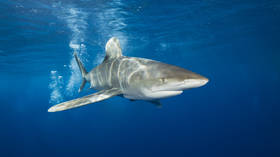Shark Week not diverse enough – study

The Discovery Channel’s ‘Shark Week’, a 34-year-old initiative showcasing the marine predator and the people who study it, is overwhelmingly white, according to a group of researchers. They published their conclusions with the Public Library of Science last month – and they’re not talking about the sharks.
Not only did the programming feature far more male experts and commentators (78%) than female – already a red flag in a field that currently consists of more than 50% women – it actually included more men named “Mike” than women at all, the researchers found. Over 90% of the 229 experts who featured in the episodes they watched were white.
“When there are hundreds of people of color interested who work in this field, [and] when my field is more than half women, maybe it’s not an accident anymore that they’re only featuring white men,” Arizona University conservationist and study co-author David Shiffman told the Washington Post on Monday.
Another diversity study Shiffman co-authored found that, while more than half the members of the American Elasmobranch Society, an academic group devoted to the study of sharks and other fish, were women, over 70% of its leadership positions had been held by men.
Not only are those who study sharks misrepresented on the screen, the study found, but the sharks themselves were portrayed negatively. “Shark Week is likely contributing to the collective public perception of sharks as bad,” the researchers complained, while acknowledging that “limited conservation messaging does appear in 53% of the episodes analyzed” and that a previous study actually found Shark Week viewers were more conservation-minded than people who didn’t watch the programming.
The researchers also lamented that the sharks featured were insufficiently diverse, observing that Discovery concentrates on the three species of shark most associated with shark attacks (notably referring to “the white shark Carcharodon carcharias” in the place of its better-known moniker the “Great White Shark”) and not those most threatened by extinction.
Discovery refused to comment on a previous version of the study published in 2021, pointing out it “[had] yet to pass any scientific approvals.” Study co-author Lisa Whitenack claims it has since undergone scientific review.














